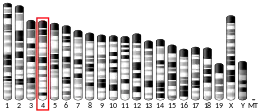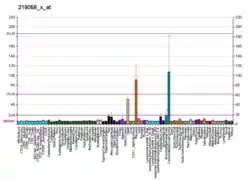TINAGL1
Tubulointerstitial nephritis antigen-like is a protein that in humans is encoded by the TINAGL1 gene.[5][6]
| TINAGL1 | |||||||||||||||||||||||||||||||||||||||||||||||||||
|---|---|---|---|---|---|---|---|---|---|---|---|---|---|---|---|---|---|---|---|---|---|---|---|---|---|---|---|---|---|---|---|---|---|---|---|---|---|---|---|---|---|---|---|---|---|---|---|---|---|---|---|
| Identifiers | |||||||||||||||||||||||||||||||||||||||||||||||||||
| Aliases | TINAGL1, ARG1, LCN7, LIECG3, TINAGRP, tubulointerstitial nephritis antigen like 1 | ||||||||||||||||||||||||||||||||||||||||||||||||||
| External IDs | OMIM: 616064 MGI: 2137617 HomoloGene: 41472 GeneCards: TINAGL1 | ||||||||||||||||||||||||||||||||||||||||||||||||||
| |||||||||||||||||||||||||||||||||||||||||||||||||||
| |||||||||||||||||||||||||||||||||||||||||||||||||||
| |||||||||||||||||||||||||||||||||||||||||||||||||||
| |||||||||||||||||||||||||||||||||||||||||||||||||||
| |||||||||||||||||||||||||||||||||||||||||||||||||||
| Wikidata | |||||||||||||||||||||||||||||||||||||||||||||||||||
| |||||||||||||||||||||||||||||||||||||||||||||||||||
References
- GRCh38: Ensembl release 89: ENSG00000142910 - Ensembl, May 2017
- GRCm38: Ensembl release 89: ENSMUSG00000028776 - Ensembl, May 2017
- "Human PubMed Reference:". National Center for Biotechnology Information, U.S. National Library of Medicine.
- "Mouse PubMed Reference:". National Center for Biotechnology Information, U.S. National Library of Medicine.
- Wex T, Lipyansky A, Bromme NC, Wex H, Guan XQ, Bromme D (Feb 2001). "TIN-ag-RP, a novel catalytically inactive cathepsin B-related protein with EGF domains, is predominantly expressed in vascular smooth muscle cells". Biochemistry. 40 (5): 1350–7. doi:10.1021/bi002266o. PMID 11170462.
- "Entrez Gene: TINAGL1 tubulointerstitial nephritis antigen-like 1".
Further reading
- Brömme NC, Wex T, Wex H, et al. (2000). "Cloning, characterization, and expression of the human TIN-ag-RP gene encoding a novel putative extracellular matrix protein". Biochem. Biophys. Res. Commun. 271 (2): 474–80. doi:10.1006/bbrc.2000.2639. PMID 10799322.
- Jiang LQ, Wen SJ, Wang HY, Chen LY (2003). "Screening the proteins that interact with calpain in a human heart cDNA library using a yeast two-hybrid system". Hypertens. Res. 25 (4): 647–52. doi:10.1291/hypres.25.647. PMID 12358155.
- Strausberg RL, Feingold EA, Grouse LH, et al. (2003). "Generation and initial analysis of more than 15,000 full-length human and mouse cDNA sequences". Proc. Natl. Acad. Sci. U.S.A. 99 (26): 16899–903. Bibcode:2002PNAS...9916899M. doi:10.1073/pnas.242603899. PMC 139241. PMID 12477932.
- Clark HF, Gurney AL, Abaya E, et al. (2003). "The secreted protein discovery initiative (SPDI), a large-scale effort to identify novel human secreted and transmembrane proteins: a bioinformatics assessment". Genome Res. 13 (10): 2265–70. doi:10.1101/gr.1293003. PMC 403697. PMID 12975309.
- Ota T, Suzuki Y, Nishikawa T, et al. (2004). "Complete sequencing and characterization of 21,243 full-length human cDNAs". Nat. Genet. 36 (1): 40–5. doi:10.1038/ng1285. PMID 14702039.
- Colland F, Jacq X, Trouplin V, et al. (2004). "Functional proteomics mapping of a human signaling pathway". Genome Res. 14 (7): 1324–32. doi:10.1101/gr.2334104. PMC 442148. PMID 15231748.
- Zhang Z, Henzel WJ (2005). "Signal peptide prediction based on analysis of experimentally verified cleavage sites". Protein Sci. 13 (10): 2819–24. doi:10.1110/ps.04682504. PMC 2286551. PMID 15340161.
- Gerhard DS, Wagner L, Feingold EA, et al. (2004). "The status, quality, and expansion of the NIH full-length cDNA project: the Mammalian Gene Collection (MGC)". Genome Res. 14 (10B): 2121–7. doi:10.1101/gr.2596504. PMC 528928. PMID 15489334.
- Wan D, Gong Y, Qin W, et al. (2004). "Large-scale cDNA transfection screening for genes related to cancer development and progression". Proc. Natl. Acad. Sci. U.S.A. 101 (44): 15724–9. Bibcode:2004PNAS..10115724W. doi:10.1073/pnas.0404089101. PMC 524842. PMID 15498874.
- Rual JF, Venkatesan K, Hao T, et al. (2005). "Towards a proteome-scale map of the human protein-protein interaction network". Nature. 437 (7062): 1173–8. Bibcode:2005Natur.437.1173R. doi:10.1038/nature04209. PMID 16189514. S2CID 4427026.
- Otsuki T, Ota T, Nishikawa T, et al. (2007). "Signal sequence and keyword trap in silico for selection of full-length human cDNAs encoding secretion or membrane proteins from oligo-capped cDNA libraries". DNA Res. 12 (2): 117–26. doi:10.1093/dnares/12.2.117. PMID 16303743.
- Umeyama H, Iwadate M, Taguchi YH (2014). "TINAGL1 and B3GALNT1 are potential therapy target genes to suppress metastasis in non-small cell lung cancer". BMC Genomics. 15 (Suppl 9): S2. doi:10.1186/1471-2164-15-S9-S2. PMC 4290609. PMID 25521548.
- Bosse K, Haneder S, Arlt C, Ihling CH, Seufferlein T, Sinz A (2016). "Mass spectrometry-based secretome analysis of non-small cell lung cancer cell lines". Proteomics. 16 (21): 2801–2814. doi:10.1002/pmic.201600297. PMID 27569058. S2CID 38155519.
This article is issued from Wikipedia. The text is licensed under Creative Commons - Attribution - Sharealike. Additional terms may apply for the media files.




